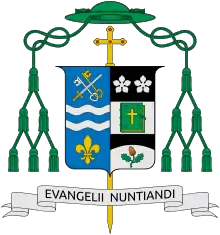George Crompton Ambrose Burton (7 June 1852 – 8 February 1931) was an English prelate of the Roman Catholic Church. He served as Bishop of Clifton from 1902 to 1931.[1]
Born in Kingston upon Hull on 28 April 1856, he was ordained to the priesthood on 31 May 1890. He was appointed the Bishop of the Diocese of Clifton by the Holy See on 15 March 1902. His consecration to the episcopate took place on 1 May 1902 at the pro-Cathedral in Clifton, the principal consecrator was Arthur George Riddell, Bishop of Northampton, and the principal co-consecrators were Thomas Whiteside, Bishop (later Archbishop) of Liverpool and Richard Preston, Auxiliary Bishop of Hexham and Newcastle.[1][2]
He served as Bishop of Clifton during the Great War, during which he consecrated the Woodchester wayside cross (thought to be the first Great War memorial in the country) and condemned the Anglican Bishop of Birmingham Henry Wakefield for anti-Catholic bigotry, after he referred to British Roman Catholics as "guests of the nation".[3][4]
Burton died in office on 8 February 1931, aged 74.[1]
References
- 1 2 3 "Bishop George Ambrose Burton". Catholic-Hierarchy.org. David M. Cheney. Retrieved 26 June 2011.
- ↑ "Ecclesiastical Intelligence". The Times. No. 36757. London. 2 May 1902. p. 9.
- ↑ The Stroud Valleys in the Great War. Camilla Boon, Five Valleys Great War Researchers Group. Stroud, Gloucestershire. 2017. pp. 104–107. ISBN 978-0-7509-8185-9. OCLC 965723318.
{{cite book}}: CS1 maint: location missing publisher (link) CS1 maint: others (link) - ↑ Snape, Michael (2002). "British Catholicism and the British Army in the First World War". British Catholic History. 26 (2): 330–1, 314–358. doi:10.1017/S0034193200030909. ISSN 0034-1932.
